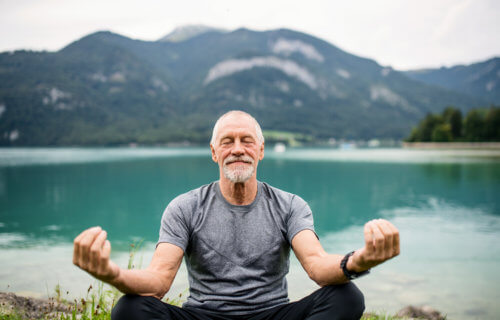LONDON — Meditation can significantly improve the well-being of older adults, a new study reveals. Researchers in London have found that a specially designed meditation program can enhance the mental health of adults over 65 years-old.
This program consisted of a nine-month mindfulness module, followed by a nine-month module on loving-kindness and compassion. It also included weekly group sessions lasting two hours, daily 20-minute home practice, and a one-day retreat.
Participants who completed the course experienced considerable improvements in well-being, particularly in areas of awareness, connection, and insight. These improvements fostered a sense of calm, deep satisfaction, enhanced relationships, and a more positive outlook on the world.
“As the global population ages, it is increasingly crucial to understand how we can support older adults in maintaining and deepening their psychological well-being,” says the study’s lead author, Marco Schlosser, a PhD student at University College London (UCL), in a media release. “In our study, we tested whether long-term meditation training can enhance important dimensions of well-being. Our findings suggest that meditation is a promising non-pharmacological approach to support human flourishing in late life.”
Scroll down to see 4 tips to help you successfully meditate

The study authors note that the program’s benefits did vary among participants. Those who began with lower levels of psychological well-being showed more significant improvements compared to those who already had higher well-being levels.
“We hope that further research will clarify which people are most likely to benefit from meditation training, as it may confer stronger benefits on some specific groups,” adds co-author Dr. Natalie Marchant from the UCL Division of Psychiatry. “Now that we have evidence that meditation training can help older adults, we hope that further refinements in partnership with colleagues from other research disciplines could make meditation programs even more beneficial.”
The researchers note the study represents the longest randomized meditation training trial to date, covering 18 months. The team analyzed the mental well-being of over 130 healthy French-speaking individuals between the ages of 65 and 84.
“By showing the potential of meditation programs, our findings pave the way for more targeted and effective programs that can help older adults flourish, as we seek to go beyond simply preventing disease or ill-health, and instead take a holistic approach to helping people across the full spectrum of human well-being,” says senior author Dr. Antoine Lutz from Lyon Neuroscience Research Center in Inserm, France.
What’s the best way to meditate?
One of the most common ways to meditate is to focus on your breath. To do this, sit or lie down in a comfortable position and close your eyes. Then, simply pay attention to your breath as it goes in and out of your nose or mouth. When your mind wanders, gently bring it back to your breath.
There are many different ways to meditate, and there is no right or wrong way to do it. The most important thing is to find a method that works for you and to practice it regularly.
Here are some additional tips for meditating:
- Find a quiet and comfortable place where you will not be interrupted.
- Set a timer for a few minutes and gradually increase the amount of time you meditate as you get more comfortable with it.
- Don’t judge yourself if your mind wanders. Simply acknowledge the thought and then gently bring your attention back to your breath.
- Be patient and consistent with your practice. It may take some time to see results.
The findings are published in the journal PLoS ONE.
South West News Service writer Isobel Williams contributed to this report.

